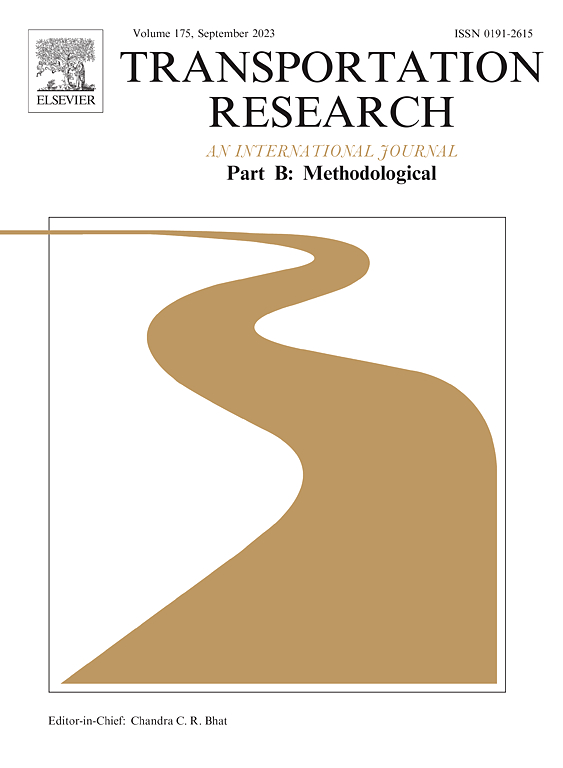考虑乘客选择行为的交通网络设计与频率设置问题的多目标进化算法
IF 6.3
1区 工程技术
Q1 ECONOMICS
引用次数: 0
摘要
交通网络设计与频率设置问题在城市交通系统规划中起着至关重要的作用。由于服务水平与运营成本之间存在冲突,人们进行了广泛的研究,以获得用户和运营商利益之间的一套权衡方案。然而,大多数研究忽略了TNDFSP中站点拥塞的影响,导致解决方案不现实或未能实现最优设计方案。因此,本研究考虑站塞情况下用户选择行为的TNDFSP多目标优化问题。为了解决这一问题,首先建立了一个多目标双层优化模型。上层是一个双目标优化模型,有两个相互冲突的目标:最小化用户成本和最小化操作员成本。下层问题是车站拥挤情况下的乘客分配问题。在此基础上,提出了一种基于目标空间分解的多目标进化算法(MOEA-OSD)。在处理多目标优化问题时,提出了一种分解机制,将问题分解为多个子问题。采用新设计的选择过程和精英保存策略,采用进化方法对子问题进行优化,以达到理想的收敛性和多样性。使用Mandl基准的计算结果证明了MOEA-OSD的有效性以及所提模型在获得更全面的权衡解方面的优势。本文章由计算机程序翻译,如有差异,请以英文原文为准。
A novel multi-objective evolutionary algorithm for transit network design and frequency-setting problem considering passengers’ choice behaviors under station congestion
The transit network design and frequency-setting problem (TNDFSP) plays a critical role in urban transit system planning. Due to the conflict between the level of service and operating costs, extensive research has been conducted to obtain a set of trade-off solutions between the interests of users and operators. However, most studies ignored the effects of station congestion in TNDFSP, resulting in unrealistic solutions or a failure to achieve optimal design schemes. Therefore, this study investigates the multi-objective optimization of TNDFSP considering users’ choice behaviors under station congestion. To address the problem, a multi-objective bilevel optimization model is first formulated. The upper level is a bi-objective optimization model with two conflicting objectives: minimizing users’ cost and minimizing operator’s cost. The lower-level problem is a passenger assignment problem under station congestion. Moreover, a novel multi-objective evolutionary algorithm based on objective space decomposition (MOEA-OSD) is proposed to solve the complex problem. When dealing with multi-objective optimizations, a decomposition mechanism is developed to convert the problem into multiple subproblems. These subproblems are optimized using an evolutionary approach with newly designed selection process and elite preservation strategy to achieve desirable convergence and diversity. The computational results obtained using Mandl’s benchmark demonstrate the efficacy of MOEA-OSD and the advantage of the proposed model in achieving more comprehensive trade-off solutions.
求助全文
通过发布文献求助,成功后即可免费获取论文全文。
去求助
来源期刊
CiteScore
12.40
自引率
8.80%
发文量
143
审稿时长
14.1 weeks
期刊介绍:
Transportation Research: Part B publishes papers on all methodological aspects of the subject, particularly those that require mathematical analysis. The general theme of the journal is the development and solution of problems that are adequately motivated to deal with important aspects of the design and/or analysis of transportation systems. Areas covered include: traffic flow; design and analysis of transportation networks; control and scheduling; optimization; queuing theory; logistics; supply chains; development and application of statistical, econometric and mathematical models to address transportation problems; cost models; pricing and/or investment; traveler or shipper behavior; cost-benefit methodologies.

 求助内容:
求助内容: 应助结果提醒方式:
应助结果提醒方式:


